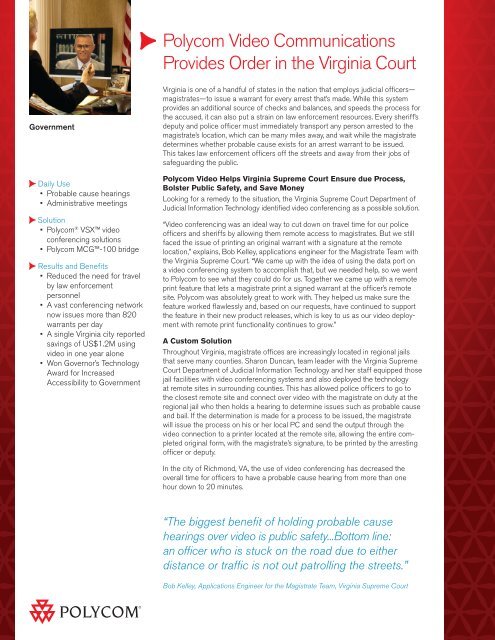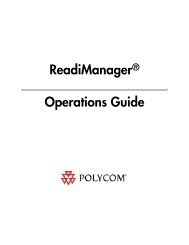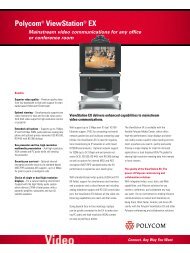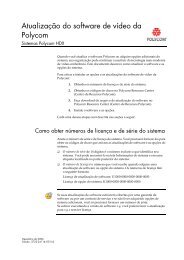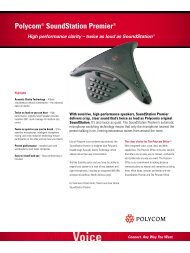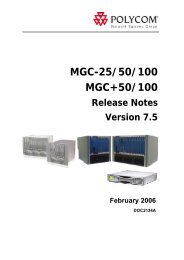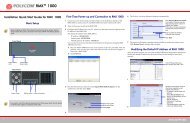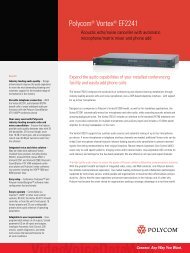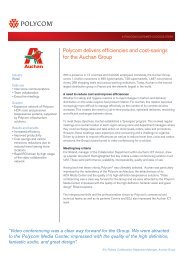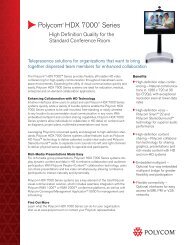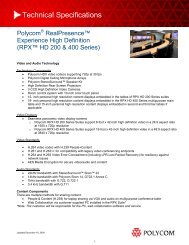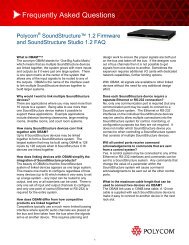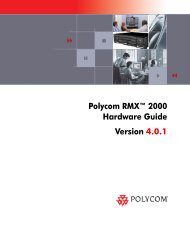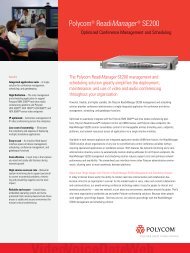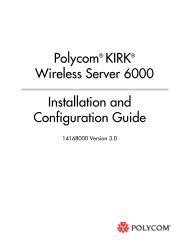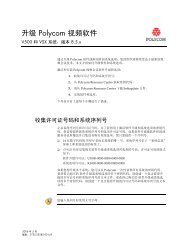Virginia Supreme Court - Polycom
Virginia Supreme Court - Polycom
Virginia Supreme Court - Polycom
Create successful ePaper yourself
Turn your PDF publications into a flip-book with our unique Google optimized e-Paper software.
Government<br />
Daily Use<br />
• Probable cause hearings<br />
• Administrative meetings<br />
Solution<br />
• <strong>Polycom</strong> ® VSX video<br />
conferencing solutions<br />
• <strong>Polycom</strong> MCG-100 bridge<br />
Results and Benefits<br />
• Reduced the need for travel<br />
by law enforcement<br />
personnel<br />
• A vast conferencing network<br />
now issues more than 820<br />
warrants per day<br />
• A single <strong>Virginia</strong> city reported<br />
savings of US$1.2M using<br />
video in one year alone<br />
• Won Governor’s Technology<br />
Award for Increased<br />
Accessibility to Government<br />
<strong>Polycom</strong> Video Communications<br />
Provides Order in the <strong>Virginia</strong> <strong>Court</strong><br />
<strong>Virginia</strong> is one of a handful of states in the nation that employs judicial officers—<br />
magistrates—to issue a warrant for every arrest that’s made. While this system<br />
provides an additional source of checks and balances, and speeds the process for<br />
the accused, it can also put a strain on law enforcement resources. Every sheriff’s<br />
deputy and police officer must immediately transport any person arrested to the<br />
magistrate’s location, which can be many miles away, and wait while the magistrate<br />
determines whether probable cause exists for an arrest warrant to be issued.<br />
This takes law enforcement officers off the streets and away from their jobs of<br />
safeguarding the public.<br />
<strong>Polycom</strong> Video Helps <strong>Virginia</strong> <strong>Supreme</strong> <strong>Court</strong> Ensure due Process,<br />
Bolster Public Safety, and Save Money<br />
Looking for a remedy to the situation, the <strong>Virginia</strong> <strong>Supreme</strong> <strong>Court</strong> Department of<br />
Judicial Information Technology identified video conferencing as a possible solution.<br />
“Video conferencing was an ideal way to cut down on travel time for our police<br />
officers and sheriffs by allowing them remote access to magistrates. But we still<br />
faced the issue of printing an original warrant with a signature at the remote<br />
location,” explains, Bob Kelley, applications engineer for the Magistrate Team with<br />
the <strong>Virginia</strong> <strong>Supreme</strong> <strong>Court</strong>. “We came up with the idea of using the data port on<br />
a video conferencing system to accomplish that, but we needed help, so we went<br />
to <strong>Polycom</strong> to see what they could do for us. Together we came up with a remote<br />
print feature that lets a magistrate print a signed warrant at the officer’s remote<br />
site. <strong>Polycom</strong> was absolutely great to work with. They helped us make sure the<br />
feature worked flawlessly and, based on our requests, have continued to support<br />
the feature in their new product releases, which is key to us as our video deployment<br />
with remote print functionality continues to grow.”<br />
A Custom Solution<br />
Throughout <strong>Virginia</strong>, magistrate offices are increasingly located in regional jails<br />
that serve many counties. Sharon Duncan, team leader with the <strong>Virginia</strong> <strong>Supreme</strong><br />
<strong>Court</strong> Department of Judicial Information Technology and her staff equipped those<br />
jail facilities with video conferencing systems and also deployed the technology<br />
at remote sites in surrounding counties. This has allowed police officers to go to<br />
the closest remote site and connect over video with the magistrate on duty at the<br />
regional jail who then holds a hearing to determine issues such as probable cause<br />
and bail. If the determination is made for a process to be issued, the magistrate<br />
will issue the process on his or her local PC and send the output through the<br />
video connection to a printer located at the remote site, allowing the entire completed<br />
original form, with the magistrate’s signature, to be printed by the arresting<br />
officer or deputy.<br />
In the city of Richmond, VA, the use of video conferencing has decreased the<br />
overall time for officers to have a probable cause hearing from more than one<br />
hour down to 20 minutes.<br />
“The biggest benefit of holding probable cause<br />
hearings over video is public safety...Bottom line:<br />
an officer who is stuck on the road due to either<br />
distance or traffic is not out patrolling the streets.”<br />
Bob Kelley, Applications Engineer for the Magistrate Team, <strong>Virginia</strong> <strong>Supreme</strong> <strong>Court</strong>
The <strong>Virginia</strong> <strong>Supreme</strong> <strong>Court</strong> has deployed more than 300 <strong>Polycom</strong><br />
video conferencing solutions, 120 of which feature the remote<br />
print functionality, and Duncan anticipates an increase in the<br />
number of remote-print enabled systems moving forward.<br />
A Matter of Public Safety<br />
“The biggest benefit of holding probable cause hearings over video<br />
is public safety,” says Kelley. “For example, in <strong>Virginia</strong>’s numerous<br />
rural towns, there may only be one state trooper and one sheriff on<br />
active duty overnight in a county. If one of those officers is required<br />
to drive to a location two counties away and wait to see a magistrate<br />
in person, the county is severely understaffed and vulnerable,<br />
essentially having lost half of its law enforcement resources. Video<br />
hearings also save time in urban settings where a 15-mile trip to<br />
see a magistrate in person can take upwards of 40 minutes due<br />
to traffic. Bottom line: an officer who is stuck on the road due to<br />
either distance or traffic is not out patrolling the streets.”<br />
<strong>Virginia</strong> law enforcement agencies have embraced the tech nology<br />
solutions, with 300,000 of the state’s 1.1 million warrants issued<br />
over video, an average of 820 per day. And the <strong>Supreme</strong> <strong>Court</strong>’s<br />
Department of Judicial Information Technology was recently<br />
honored at the Governor’s Technology Awards with the Increased<br />
Accessibility to Government prize. The award recognizes use of<br />
innovative technologies to improve citizen access to and service<br />
from governmental entities of any type. The <strong>Supreme</strong> <strong>Court</strong> of<br />
<strong>Virginia</strong> was recognized for its use of video conferencing to provide<br />
real time access to magistrates, others in the legal system and<br />
citizens.<br />
<strong>Virginia</strong> <strong>Supreme</strong> <strong>Court</strong> Video Engineer Eric Turner cites the city of<br />
Richmond as an example of the video deployment in action. “Richmond<br />
faces all of the problems any urban center contends with,”<br />
he explains, “but in addition, it’s on a major highway that runs from<br />
Florida to Maine and sees serious drug traffic.”<br />
The city deployed 13 <strong>Polycom</strong> video conferencing units and<br />
estimates that in the first year alone it saved $1.2 million dollars in<br />
deputy overtime. “Richmond reports that the video deployment paid<br />
for itself in the space of about three months,” adds Turner.<br />
The IT Perspective<br />
The <strong>Virginia</strong> <strong>Supreme</strong> <strong>Court</strong> video network comprises <strong>Polycom</strong> video<br />
conferencing solutions at more than 300 facilities throughout the<br />
state. These systems include the company’s flagship VSX line,<br />
which features Siren 14 audio and <strong>Polycom</strong> StereoSurround<br />
to deliver the best audio and video performance in the industry.<br />
<strong>Polycom</strong>’s MGC-100 bridge facilitates multipoint and mixed IP and<br />
ISDN calls.<br />
The remote print functionality of the <strong>Virginia</strong> <strong>Supreme</strong> <strong>Court</strong><br />
deployment is unique among court systems. Jail facilities where<br />
magistrates are located have been equipped with <strong>Polycom</strong> video<br />
conferencing systems, allowing police officers to connect with<br />
a magistrate remotely over video for hearings. If the magistrate<br />
needs to issue a process, it can be created locally on his or her PC<br />
and the output sent to a printer located at the remote site, allowing<br />
<strong>Polycom</strong> Worldwide Headquarters<br />
4750 Willow Road, Pleasanton, CA 94588<br />
1.800.POLYCOM or +1.925.924.6000<br />
www.polycom.com<br />
the entire completed original form, with the magistrate’s signature,<br />
to be printed by the officer or deputy.<br />
Leveraging the Network<br />
The <strong>Supreme</strong> <strong>Court</strong> of <strong>Virginia</strong> leverages its expansive video<br />
network well beyond virtual probable cause hearings, and Kelley<br />
reports that it is fully integrated into the judicial process, and with<br />
the exception of criminal trials, video conferencing can be used<br />
for a wide spectrum of judicial proceedings. On several occasions,<br />
video conferencing has been used to try civil cases in which a<br />
maximum-security defendant is violent, making transport to and<br />
from a courtroom costly and dangerous. It can require up to three<br />
police cars to transport one dangerous inmate - a lead car, a chase<br />
car, and a vehicle with the defendant guarded by two officers.<br />
“Once again, it comes down to public safety—the fewer times you<br />
put a criminal in a position to escape, the better,” says Kelley.<br />
Juvenile detention hearings are another example of the benefits<br />
of the video deployment. A juvenile detention home can be located<br />
half a state away from the Juvenile Domestic Relations <strong>Court</strong> where<br />
hearings take place. Thanks to video, no physical transfer is required.<br />
The <strong>Supreme</strong> <strong>Court</strong> justices also benefit from the availability of<br />
video, holding meetings between the Chief Justice and the other<br />
justices who all live in different areas of the state.<br />
The Right Products<br />
The <strong>Supreme</strong> <strong>Court</strong> IT staff has deployed <strong>Polycom</strong> video conferencing<br />
solutions at more than 300 facilities throughout the state.<br />
These systems include <strong>Polycom</strong>’s flagship VSX family of solutions<br />
which offer the industry’s highest voice and video quality. For mixed<br />
IP and ISDN and multipoint calls, the organization uses <strong>Polycom</strong>’s<br />
MGC-100 bridge.<br />
“We’ve been very impressed with the price/performance of the<br />
VSX 7000,” says Turner. “It’s got the functionality the courts need,<br />
and is cost effective so that a greater number of area courts are<br />
able to adopt the technology.”<br />
Keys to an Effective Judicial Video Network<br />
For other court systems looking into leveraging the safety benefits<br />
and time and cost savings a video conferencing network provides,<br />
Kelley stresses consolidation and standardization.<br />
“In 1998 some courts started using video, they were all deploying<br />
different systems, on different networks,” he explains. “It was at<br />
that point that we decided to spearhead the effort and take control<br />
by developing one unified conferencing network that would allow<br />
every site in the state to connect and communicate. This eliminated<br />
a lot of headaches.”<br />
Kelley also advises asking vendors for the technology solution you<br />
need, and suggests that you might be happily surprised at how<br />
willing they are to help, as he was. Finally, Kelley feels that learning<br />
from others is invaluable and adds, “there is no reason to reinvent<br />
the wheel, learn from others and save yourself time and money.”<br />
© 2009, <strong>Polycom</strong>, Inc. All rights reserved. <strong>Polycom</strong> and the <strong>Polycom</strong> logo design are registered trademarks of <strong>Polycom</strong>, Inc. in the U.S. and various countries. All other trademarks are the property of their respective owners.<br />
Information in this document is subject to change without notice.<br />
Rev 033109


